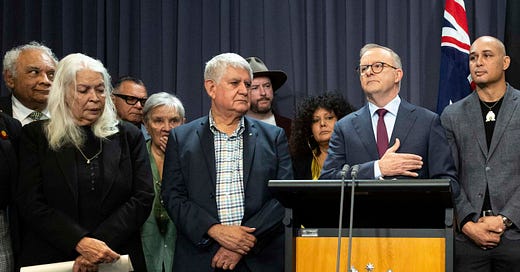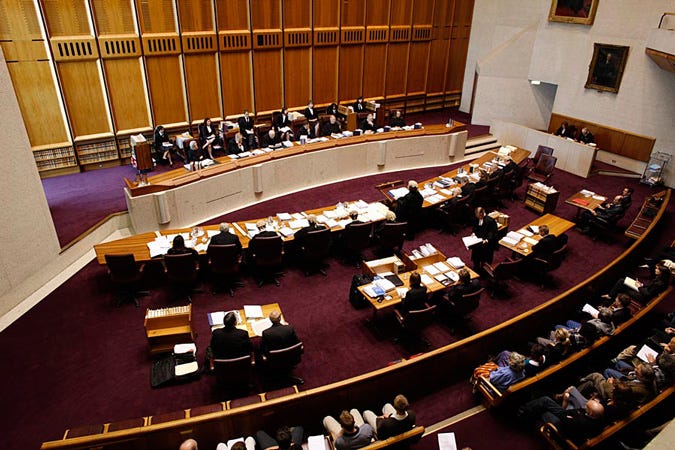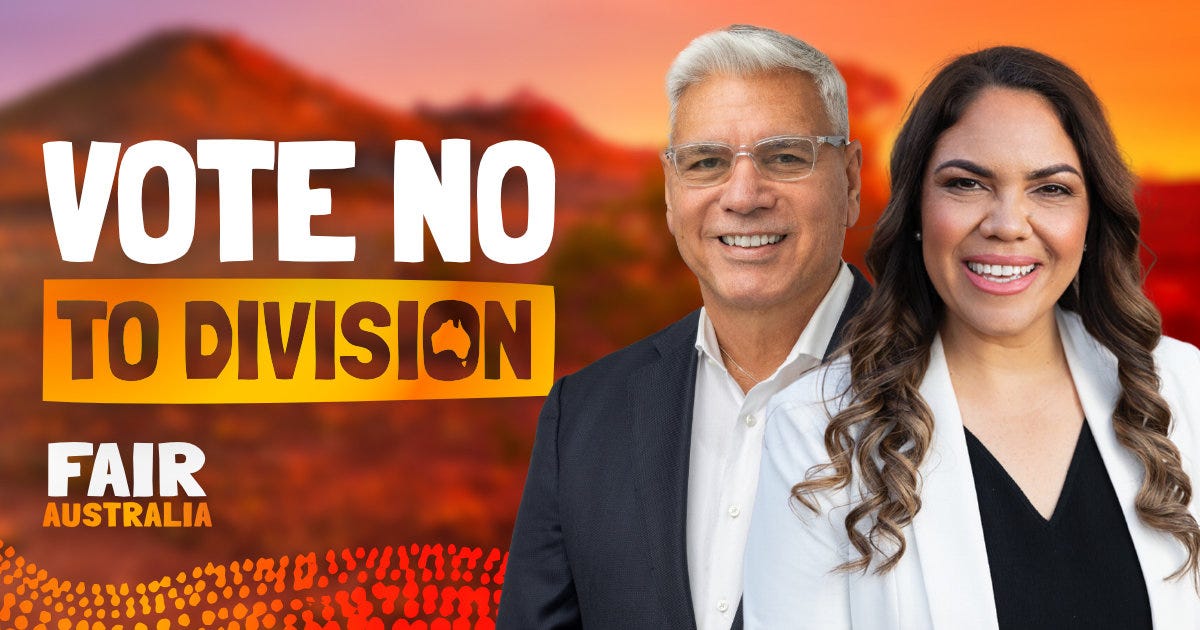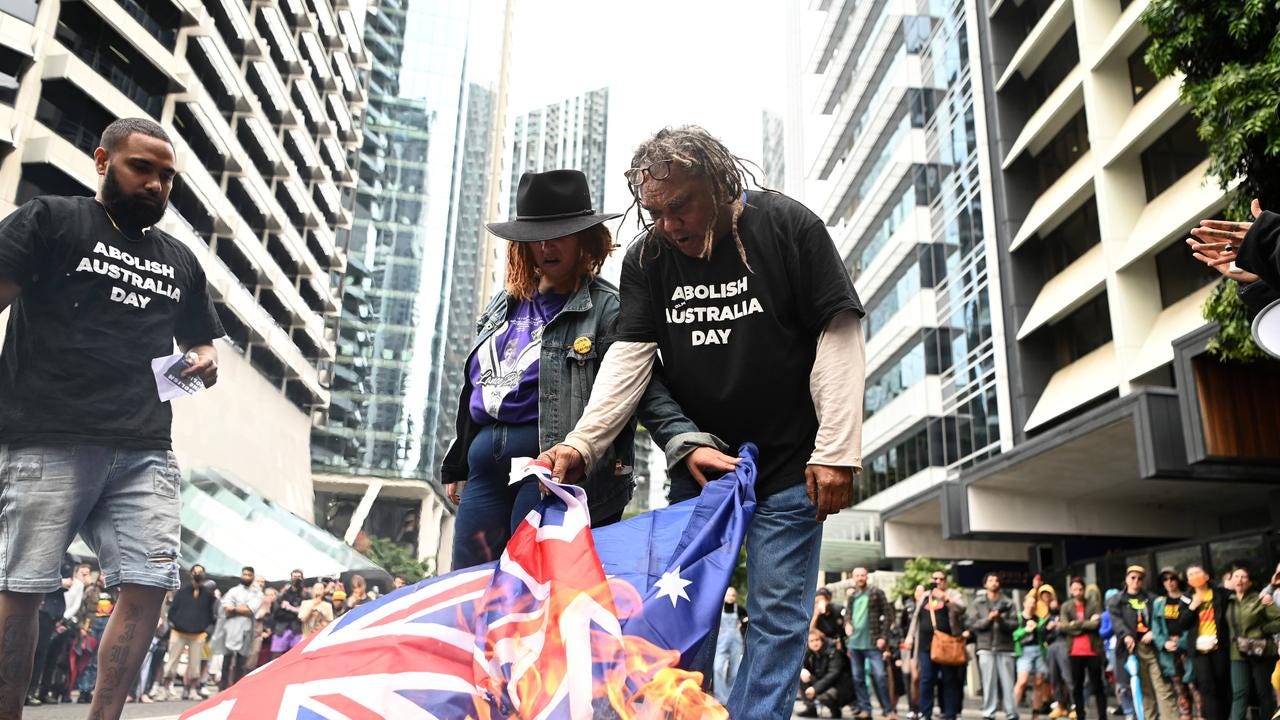The Case Against the Voice to Parliament
Guest writer Frederick Drake (@AntipodeEmpire) dismantles the Voice to Parliament while dissecting the arguments against it [12 Minute Read]
By Frederick Drake, find more of his content @AntipodeEmpire on 𝕏
The ‘Aboriginal Voice to Parliament’ referendum is fast approaching, with Australians set to go to the polls on the 14th of October and answer either yes or no to one question:
“A Proposed Law: to alter the Constitution to recognise the First Peoples of Australia by establishing an Aboriginal and Torres Strait Islander Voice.
Do you approve this proposed alteration?”
Incredibly, despite massive left-wing regime support and weak opposition from the constellation of organisations and figureheads that comprise the establishment (so-called) “right”, polls have demonstrated that the referendum is on track to lose. If this forecasted result is correct and the ‘No’ vote does win, this will be a major victory for Australian identity and the entire Australian right-wing.
However, unless Australians are clear on why the very concept of the Voice is detrimental to our nation, we can expect the idea to return, in one form or another.
As always, the establishment right has left much to be desired: it has focussed on technicalities but presented no substantive critique of the fundamental premises upon which the Voice has been built; instead it has worked overtime to defend the liberal principles of race-blind equality of opportunity. Of the criticisms presented, only the latter, if it were not so watered-down in presentation, could ever have a chance of banishing the grievance-industrial complex that has come to overshadow Australia and the West’s post-war national consciousness.
Any criticisms of the “Voice” that step outside this leftist moral framework are sidelined, and it is left to independent publications like the National Observer to offer alternative, deeper criticisms. Let us then comprehensively review the arguments against the ‘Voice’, beginning with those most obvious and frequently repeated, before moving to those which are deeper and which - if fully embraced - have a real chance of ridding us of anything like the “Voice to Parliament”, definitively.
1. Don’t Know? Vote No.
The most basic argument against the “Voice to Parliament” is that we have very little idea of how it will work in practice, what powers it will have, and what it is even supposed to do and be. The strategy of the yes-supporters has explicitly been to avoid providing detail – as such, they have had little response to this most basic of criticisms: their line has been “Just trust us” and “We’ll deal with that later.” But if we don’t know what the Voice would be, then what would we be voting for?
While emphasising the uncertainty about the outcomes of a Voice may be a successful short-term strategy, the problem with this no-argument is that it is agnostic, and does not respond to any of the arguments for the Voice, the right should be resolutely opposed to anything resembling the proposed Voice to Parliament and taking action to reverse its antecedents - native title and other privileges - which we will discuss later on.
2. Banal Technicalities
The prime minister has said that he did not want a repeat of the 1999 referendum, which according to him was defeated because of voters’ disagreement on technicalities. The few details we do not about the Aboriginal Voice are cause for serious concern even amongst the sympathetic – what exactly does “makes representations to parliament” mean? Would parliament be able to ignore the Voice?
The High Court would be left to rule on such matters, which is worrying: the history of our High Court is one of activism, interpreting the law according to its supposed spirit. What is the “spirit” of the Aboriginal Voice to Parliament? If one of its most vocal supporters, Thomas Mayo, is to be believed, then reparations, an ongoing “rent” tax, the abolition of colonial institutions, and even communist ideas are all implicit in the Aboriginal Voice to Parliament.
Beyond any questions we might have, we already know that, once established, parliament would not be able to abolish the Voice if it proves unworkable, except through another referendum – but by then, the institution will already be in place.
Besides the fact that getting into the weeds is uninspiring and difficult for the public, this criticism is also agnostic or even supportive of a Voice – just not this Voice.
3. Racism & Reverse Racism
The most common argument amongst opponents of the proposed Voice to Parliament is that it would divide Australians by race, granting privileges and special representation to Aboriginals above other Australians. Even the supposedly conservative former prime minister John Howard was happy to quote Bob Hawke while arguing against the Voice: “In Australia there is no hierarchy of descent; there must be no privilege of origin…. The commitment to Australia is the only thing needful to be a true Australian.”
There is no answer to this other than to say that Aboriginals deserve the Voice for some reason or another – usually past wrongs, which have been by now mythologized and greatly exaggerated, or because Aboriginal people would be better able to help other Aboriginal people. The former requires a more detailed response, but the latter is easily dismissed: Should English Australians also have a Voice to Parliament? Should Irish Australians also have a Voice to Parliament? Should we institute, as the Romans did, separate legal courts for different ethnic groups?
Since the end of World War II, the bureaucrat class has worked tirelessly to flatten, sideline, or suppress almost all forms of collective identity; for the liberal, the Voice presents an additional danger: not only would it empower one ethnic group over another, but also it would lead to a reopening of racial politics – better to nip that in the bud.
But the Voice would be only the latest in a long line of policies that benefit Aboriginals unfairly: native title, economic support, scholarships, and make-work jobs will not go away if the Voice is defeated, and as for there being “no hierarchy of descent”, it is a barefaced lie – in 2020, the High Court ruled that Aboriginal people cannot be deported as ‘aliens’ even when born overseas, a special privilege not afforded to anyone else.
4. Aboriginal Representation
Amongst the critics of the Voice are those who – sympathetic or not – argue that the body will not serve its stated purpose, that being to provide representation to Aboriginal and Torres Strait Islanders. There are several reasons for this:
It is likely to have a low number of members - perhaps 24 – to represent the hundreds of Aboriginal and Torres-Strait-Islander groups in Australia;
As seen in the recently created First People’s Assembly in Victoria, which was met with wry amusement globally, the members are likely to be Globalised, city-dwelling, White Aboriginals, who will further their interests, and the interests of the bureaucrat class, over those of more traditional, rural, Black Aboriginals.
Constitutions are normally intended to limit powers, not create them: it is incomprehensible, or at the least unlikely, that the bureaucrat class would create a body that did not serve its interests.
The Voice to Parliament cannot hope to represent Aboriginal interests. They will be too few in number to represent the hundreds of Aboriginal groups, which are incredibly diverse in terms of language, culture, religion, geography, etc. The members elected would be those already close to power, current members of the political system, serving its interests rather than those that they would claim to represent. But, once again, these criticisms are still agnostic about the desirability o f a Voice.
5. The Slippery Slope
The Labor government in the 2022 election committed to the “Uluru Statement from the Heart”, a document which describes the Voice as the first step on a path that would give us a “Makarrata Commission” (The name is revealing), a treaty, and “truth-telling” (a name I’m sure would have given Orwell a good laugh). Reasonably, many Australians rightly suspect that the Voice to Parliament is but the narrow end of the wedge for a whole series of changes which the Voice would facilitate: reparations, changing the flag, changing the national anthem, changing the date of Australia Day, abolishing the monarchy, etc. Indeed, the fact that we are even having this referendum is itself the product of a long series of pro-Aboriginal appeasement policies: expanding the franchise was supposed to help, ceding masses of territory in native title was supposed to help, and land acknowledgements were supposed to help – but they did not. It is obvious that, if the Voice is successful, it will once again be deemed “not enough”, and more will follow – as has been the case ever since appeasement began.
The proposal for a “Voice to Parliament” has received massive top-down support – from the United Nations, big business, climate action organizations, LGBTQI+ groups – the comprehensive list is enormous. The first thing that any reasonable person asks himself is cui bono?
Obviously, these groups think that they stand to benefit in some way from the Voice.
It is likely that the Voice would operate as a backdoor for globalist, radical-left, woke policies, if not just plain old corruption – as other Aboriginal bodies have notoriously suffered from. The Calma-Langton report, which Albanese has often pointed to as a model, guarantees gender balance – but many Aboriginal groups were extremely patriarchal. What does gender balance have to do with Aboriginal representation? That the campaign for the Voice in the UK was recently opened by a LGBTQI+ activist is only further evidence of the proposed Voice to Parliament’s tangential relationship to Aboriginal interests and its alignment with the international New Left
6. Resentment & Aboriginality
Before colonisation, there was no such thing as an Aboriginal – other than its Latin sense, “[there] from the beginning [of colonisation]”. Aboriginals were those people dwelling on the landmasses of the New World discovered by the colonial powers, but Aboriginal, and its synonym indigenous, as they are understood today have quite a different meaning. When the BBC reports that “The Sami are the only indigenous people in the EU”, how are we to understand “indigenous”? Do our British cousins, who can claim descent from the inhabitants of the isles tens of thousands of years ago, not meet the definition of “indigenous”? Is Bruce Pascoe, whose claim to Aboriginality has been rejected by every group he claims descent from, “indigenous”? Are the White Aboriginals whose ancestry are almost entirely European, “indigenous”? Clearly, “indigenous” has come to mean something other than its etymological definition.
“Aboriginal” as an identity rather than simple descriptor post-dates colonisation by many years and is accruements have little to do with the much smaller, traditional local identities – the Kulin, or even its component groups the Wurundjeri, Boonwurrung, etc.; the Noongar; the Gadigal, etc.
“Aboriginal art”, which has become synonymous with dot painting, and is now displayed in most public buildings, was created in 1971 by Australian art teacher Geoffrey Bardon (a rather unimpressive vintage for the “oldest continuous culture on Earth”) and even if given its most charitable interpretation – “a translation of sand drawings to paint” – it would still be only a reflection of the Papunya people whom he taught. Likewise, the didgeridoo, which has become synonymous with Aboriginal culture, was originally geographically limited to the far north of the Australian continent – but this fact has not stopped southern Aboriginal groups from appropriating it. Furthermore, “Aboriginal” culture as distinct from local, traditional groups, has partly been assimilated into now-global “Black” culture, and partly into the global “Indigenous” culture seen in headlines like that mentioned by the BBC and represented in organizations as prominent as the United Nations. Aboriginal activists like to grandstand about being the ”oldest continuous culture on Earth”, but Aboriginality itself is a very new phenomenon, and one which has been groomed and shaped, like indigenous people and minority groups around the world, by leftist and anti-colonial groups.
As the Marxist Left Review writes, “it was in the turmoil of the Great Depression that Communist militants first began to integrate the struggle for Indigenous rights with working-class politics”. They conceived of the struggle for “Indigenous liberation” as revolutionary and anti-capitalist, and saw the working class and Indigenous peoples as natural allies – their “fellow exploited”. In South Africa, the United States, as in Australia and across the globe, communists have promoted and supported pro-Indigenous, anti-colonial causes – for their own ends. A full exposition of this relationship is beyond the scope of this article, but it is worth pointing out the environment within which “Aboriginality” was formed and has continued to develop – now one in which anything to the right of left-leaning liberalism is deemed fascism (which itself has come to mean little more than “pure evil”) – because it reveals that Aboriginality is both artificial, and essentially anti-colonial, i.e. it is an identity that is essentially defined by resentment towards Western, in our case British-Australian civilisation. The character of a proposed “Voice” becomes clear, as do the consequences of the continuous appeasement, recognition, and discussion of “Aboriginal” groups, issues, etc. by the left and so-called right.
7. Human Biodiversity & “Closing the Gap”
One of the main arguments in favour of the proposed Voice is that it would “close the gap”; that is, it would guarantee equality of outcome. Just how it would do so is unclear. Beyond the fact that Aboriginals receive more political, legal, academic, and financial support than any other group in Australia, the idea that there in fact is a “gap” is itself somewhat misleading: The 80% of Aboriginals who have never been incarcerated are doing about as well as other Australians, which is unsurprising considering the disproportionate number of resources allocated to them. But there are additional questions which must be addressed to understand the difference in outcome and the desirability of a powerful all-Aboriginal political body.
As we mentioned above, the new “Aboriginal” identity is essentially anti-colonial and aligned with the international New Left, which seeks if not total destruction of the West, then at least a radical reconfiguration of it. For those Aboriginal groups attached to their traditions, “closing the gap” between themselves and White Australia means adopting Western norms and abandoning or radically reconfiguring their culture – surely undesirable for many.
Although it has become verboten to say so, and is explicitly discouraged by the education system, Aboriginals were the most primitive people in the world before colonization – both in phenotype and in material culture. They were the only peoples in the world not to have invented the bow and arrow, and whether the Tasmanian Aboriginals even had the ability to make fire is questionable. When the Pintupi Nine made contact with the West, Anglo-Saxon civilization had already put men on the Moon. This is not necessarily to say that one is better or worse – just that, if we believe in human biodiversity and evolution, these differences obviously have consequences. That the Aboriginals did not develop technology beyond simple stone tools speaks to a temperament fundamentally different to that of Westerners. And that is not to mention that Aboriginals as a group – in spite of luminaries like David Unaipon – have a median IQ of 62, signifying intellectual impairment, and equivalent to an 11-year-old European. Are 11-year-olds treated in the same way as adult members of the community? Until age 11, children cannot be charged with a criminal offence. Would we want 11-year-olds to have a powerful political body when we don’t even allow them to vote?
The myth of the “blank slate”, which has become a cornerstone of the post-war order, means that discussion of these fundamentals is off the table. But a serious opposition to the proposed Voice, not just one based on banal technicalities, would at the very least make an attempt to grapple with these complicated issues, which could right the trajectory Australia has been on since the end of World War II.
8. Aboriginal Religions & Metaphysical Consequences
The final point to be made against the proposed Voice and related movements is that of its metaphysical consequences. A complete discussion is out of the question, as it is a topic both largely unfamiliar and complex. The spiritual traditions of Aboriginal peoples are incredibly diverse and often included an esoteric component limited to the initiated. As we have discussed, modern “Aboriginal” culture is an extremely modern phenomenon which has only a tangential relationship to pre-colonial cultures in Australia. What has survived of the majority of their traditions – at least publicly – has a composite character and has been compromised by the environment in which this new Aboriginal identity has formed. Indigenous peoples globally have been weaponised, in particular in the fight for “climate action” and so the elements of their traditions which relate to nature spirits have been emphasised. Sacred sites have been ruled off-limits, and important archaeological work – which might help clarify and demystify Aboriginal history and culture – has been made difficult if not impossible, apparently out of respect for Aboriginal beliefs, but probably because it would undo many of the modern Aboriginal myths and legends. But what about our beliefs? What about truth? If we admit the existence of spiritual powers, especially from a Christian perspective, then it is alarming that our government is already acknowledging and bowing to the spiritual directions of pagan traditions; furthermore, many traditions, including the Christian tradition – which has been at the base of Australian life, culture and government since her founding – admit the existence of nature spirits, elementals, angels, etc., but treats them only as intermediaries – if that – having a lower station in the divine hierarchy and a lunar character. The emphasis on these spirits to the total exclusion of anything celestial, solar, higher, would have metaphysical consequences that range from literal demon worship or appeasement to a severely disordered relationship to the divine. If we do not admit the existence of anything suprasensible, then it should still be concerning, as we are empowering those that do admit these things, and according to indigenous Aboriginal traditions it was acceptable not only to practise cannibalism but also to murder infants – something which, whatever faults we may raise against it, Christianity has opposed unequivocally.
Consultation with “traditional owners” and “custodians” is already the rule of the day. Aboriginal metaphysics and religious traditions already inform policy; the government has obliged the public to heed traditions which, whether telluric or demonic, superstitious or insane, are disordered and prejudicial for Australia. A Voice would only exacerbate an already bad situation.
Conclusion
We have briefly discussed the main arguments against the proposed Voice to Parliament and their shortcomings, as well as some further considerations. In summary:
1) The powers of the proposed Voice are unclear, although they are sure to be deleterious and benefit the bureaucrat class;
2) The unique status given to the Voice would mean that it would be powerful and almost impossible to get rid of once established;
3) It would divide Australians by race and cement the many privileges already granted to Aboriginal people;
4) It is impossible that the Voice could adequately represent the hundreds of Aboriginal groups in Australia;
5) The “Voice” represents a continuation of appeasement policies and would lead not only to even more appeasement, but also be used to make radical changes to Australia such as establishing a treaty, reparations, changing the flag and national anthem, etc.;
6) “Aboriginality” is a recent phenomenon that has been closely associated with the left, meaning that it is in itself a basically anti-Western identity – it is not in Australians’ interest to empower such an identity;
7) There are significant historical-cultural and biological differences between Australians and Aboriginals which mean that it would be unwise to grant them further influence without serious consideration;
8) To Westerners, Aboriginal metaphysical systems are either disordered or superstitious and should not inform public policy – enshrining a Voice means enshrining the influence of these alien systems on Australians.
Almost no criticism by the official or unofficial No Campaign against the proposed Voice has gone beyond the fourth point listed above. The establishment right has unsurprisingly been feckless and often actively harmful to opposition to the yes campaign, agreeing with them in principle and on all but technicalities, and so we hope that the reader finds something of value in this small contribution to a deeper – or at least alternative – criticism of the proposal for an Aboriginal “Voice to Parliament”.












